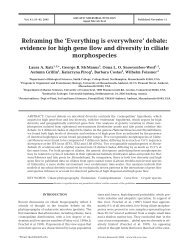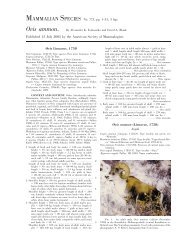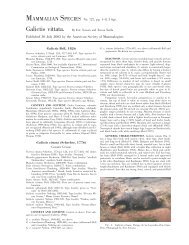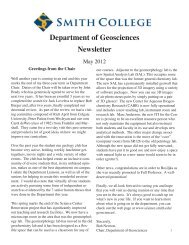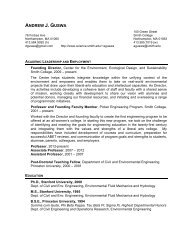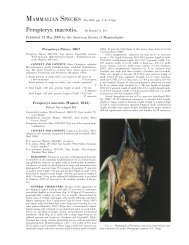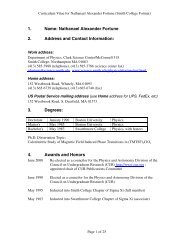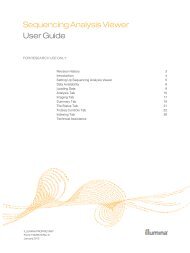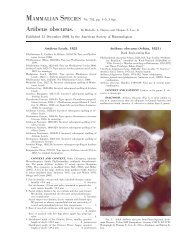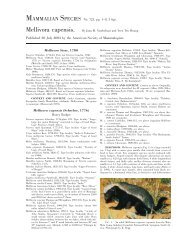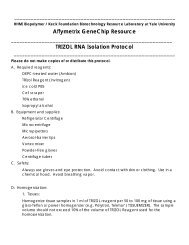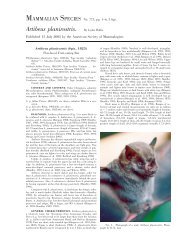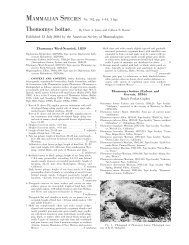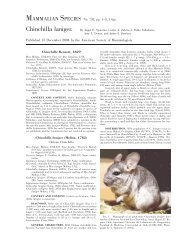Brugia Malayi - Clark Science Center - Smith College
Brugia Malayi - Clark Science Center - Smith College
Brugia Malayi - Clark Science Center - Smith College
Create successful ePaper yourself
Turn your PDF publications into a flip-book with our unique Google optimized e-Paper software.
Metagenomic Study of the Equine Gatrointestinal Tract before and after<br />
Treatment with the Antihelminthic Medication, Ivermectin<br />
Rachael Sirois<br />
Horses require constant antihelminthic treatment in order to prevent infection by a range of parasitic nematodes. Infection by<br />
parasitic nematodes can lead to a variety of symptoms, including retarded growth, weight loss, anorexia, anemia, recurrent colic,<br />
digestive disturbances, general weakness, and in severe cases, death. Many antihelminthic treatments work by interfering with the<br />
nervous system and muscle function of the parasite, but they may also eliminate other organisms, such as natural gut bacteria and<br />
fungi. The ideal way to study this process while better understanding the equine gastrointestinal tract is to conduct a metagenomic<br />
study of the gastrointestinal tract microbiome. 1 This study will be performed with the purpose of addressing two specific aims:<br />
1) identify the approximate genetic composition of samples isolated from the equine gastrointestinal tract, thereby providing an<br />
accurate representation of the microbial community, and 2) track individual species throughout the duration of the treatment cycle<br />
using high-throughput sequencing.<br />
The central hypothesis is that the presence of these parasitic nematodes, or the drugs used to treat them, may cause changes<br />
in the balance of the gastrointestinal tract microbiome and, in turn, adversely affect the health of the horse. DNA samples will be<br />
isolated from equine fecal samples throughout the duration of pre-treatment, treatment, and post-treatment with the antihelminthic<br />
medication, Ivermectin. After determination of sample genetic composition through use of the Automated Ribosomal Intergenic<br />
Spacer Analysis (ARISA) method, 2 genomic DNA samples will be sequenced using the high-throughput sequencing technology,<br />
Ion Torrent by Life Technologies, which is to be provided by New England Biolabs in Ipswich, MA. The proposed research is<br />
significant because it addresses the need for a better understanding of the equine GI tract microbiome, a valuable field that is<br />
highly underrepresented in the biology sphere.<br />
Two fecal samples, Pre-treatment with Ivermectin and Post-treatment with Ivermectin, were appropriately prepped for<br />
sequencing on the Ion Torrent, which included end-repair of the samples and adapter ligation. The Ion Torrent generates<br />
relatively shorter reads, ranging from 170-200 base pairs and thus, bioinformatics will be an important component to this project.<br />
Sequencing of the pre-treatment samples generated 986 contigs comprised of 394,376 base pairs. The next stage for this project<br />
will be to decide on a data analysis program, such as Geneious or Galaxy, to analyze the data from both Pre-treatment and Posttreatment<br />
samples. This will be the aim for my research going into the 2012-13 academic year and will be the focus of my master’s<br />
thesis to be presented at the end of the spring semester. (Supported by Blakeslee Fund in Biological <strong>Science</strong>s)<br />
Advisor: Steven Williams<br />
References:<br />
1 Santos, A. S., et al. “Understanding the Equine Cecum-Colon Ecosystem: Current Knowledge and Future Perspectives.” Animal 1.1 (2010): 1-9. Print.<br />
2<br />
Popa, R., et al. “Limitations and Benefits of ARISA Intra-Genomic Diversity Fingerprinting.” Journal of Microbiological Methods 78.2 (2009): 111-8. Print.<br />
2012<br />
50



